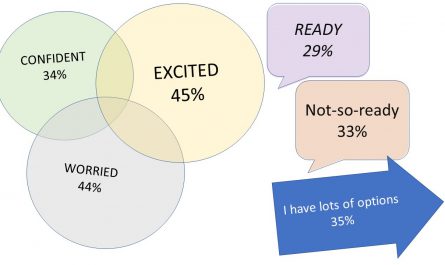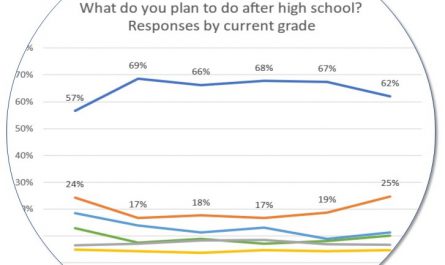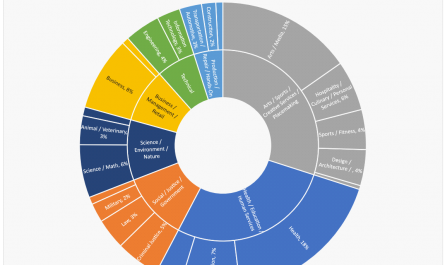In the First Career Steps survey, how many students express interest in careers related to science, environment, agriculture, nature, and the natural world? What experiences have led students to these interests? In a decade of increasing awareness of the importance of science in society, is this awareness reflected in student career goals?
In the First Career Steps Survey’s open-ended question about career interests, approximately 5.9% of survey respondents expressed interest in science and math careers, approximately 1.2% in careers in environmental work or agriculture, and 2.7% in veterinary or animal care careers. Note that these career clusters may overlap, with, for example, interest in wildlife biology and wildlife conservation spanning all three clusters. The tables at the end of the post summarize specific career interests within these career clusters.
As shown in these tables, many respondents expressed interest in careers in biology, zoology, physiology and other biological sciences. Psychology was another popular field of interest. Veterinary and veterinary technician careers were among the most popular careers mentioned. Some focused on agriculture, forestry and farming, with a handful of these responses specifically mentioning sustainable agriculture. A small percentage of the overall set of responses specifically mentioned careers related to ecology, environmental science, environmental justice and climate science, suggesting room for growth in developing career awareness in these increasingly important career areas.
When asked what types of activities and experiences have helped them to learn about careers, students who expressed interest in these science-related career clusters were especially likely to indicate that they have learned about careers through classroom projects, clubs and activities, career speakers at their schools, and through reading and looking at websites about careers.
Career Development Experiences
(Showing Selected Response Categories)

When asked what their school does to support students in their career development, and what else they would like the school to do, many respondents mentioned classroom activities.
One student wrote that the school offers “…Performance Tasks which requires applying our lessons into real-life situations, related to our chosen careers.” Another wrote: “AP classes allow students to dive in head-first into a subject, either igniting new interest or narrowing down options. Teachers allow the majority of learning to take place in the student’s hands and assist during class by supplementing information and answering questions.”
Students who are enrolled in science-themed career programs express appreciation for these opportunities:
“My school offers an agricultural-based program where I have the opportunity to do job-shadows and rotations at the Cornell University Hospital for Animals. I think they should offer more job-shadow opportunities in other areas too because I love it!”
“My school has programs such as business, biomedical science, biotechnical, environmental science, engineering, nursing and etc. These are very helpful for leading us to careers in the future. Being in the biomedical program has influenced me to look into forensic science more, and be more interested in crim, and medical fields.”
Many of the students who expressed interest in science-related careers mentioned the importance of career exploration that goes beyond the “big jobs” that are well-known. One student wrote: “I think career days are really helpful or teachers making us look at different careers. I think schools should have more classes about different opportunities not just the”big jobs” (doctor, lawyer, police officer).”
The tables below tabulate the career interests by career cluster and by more specific area within each cluster. This information can be useful to professionals who work in career development for youth, and for educators who are developing curriculum related to student career interests, and for youth thinking about what areas might be worth considering for future careers.
CAREER INTEREST TABULATION – SCIENCE/MATH, ENVIRONMENT/AGRICULTURE, and ANIMALS/VETERINARY CAREER CLUSTERS
| SCIENCE / MATH CAREER CLUSTER | Number of Responses |
| Biology | 215 |
| Psychology | 201 |
| Science/General | 118 |
| Mathematics | 78 |
| Astronomy/Astronaut | 66 |
| Zoology | 59 |
| Social Sciences | 55 |
| Physics | 50 |
| Chemistry | 42 |
| Biology/Physiology/Medical | 41 |
| Archaeology | 20 |
| Meteorology | 20 |
| Archaeology | 14 |
| Geology | 13 |
| Kinesiology/Exercise Science | 12 |
| Paleontology | 7 |
| Aerospace | 6 |
| Forensic Science | 6 |
| Actuarial Science | 4 |
| Science/Illustrator | 1 |
| ENVIRONMENT / AGRICULTURE CAREER CLUSTER | Number of Responses |
| Agriculture | 66 |
| Environment/Ecology | 50 |
| Parks / Conservation | 24 |
| Fishing / Forestry | 23 |
| Wildlife/Biology/Conservation | 21 |
| Outdoors/General | 6 |
| Agricultural Science/Food Science | 5 |
| Gardening / Horticulture | 4 |
| Landscaping | 3 |
| Water, Natural Resources | 2 |
| ANIMALS / VETERINARY CAREER CLUSTER | Number of Responses |
| Veterinary / Vet Tech | 329 |
| Animal Care | 77 |
| Zoo / Zookeeping | 19 |
| Pet Care/Grooming/Pet Shop | 18 |
| Animal Trainer/Equine | 15 |
| Animal Trainer | 11 |
| Animal Trainer/Dogs | 5 |
| Animal-Assisted Therapy | 1 |
Part of a series of posts about the First Career Steps survey. In the First Career Steps Survey, we ask “If you can, list one or more career areas that might interest you.” with room for up to four open-ended answers. From the start of the survey in November 2011 to November 2021, 6,478 of the 7,500+ survey respondents have listed one or more career interest areas in this question, with a total of 17,313 open-ended responses. Skills Library interns have coded these answers into career clusters and broad categories, allowing us to look for common interests, patterns and trends.
Thank you to Emma Klektoka and Ben Gardiner for data analysis.




